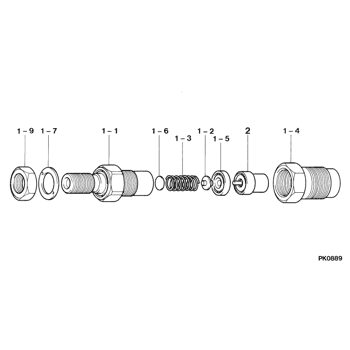Rating:
Information washer Denso
Include in ##:
09350-02240
as WASHER
Cross reference number
Part num
Firm num
Firm
Name
09317-51680
WASHER
0931751680
ME736856
MITSUBISHI
WASHER
Information:
Caterpillar recommends that the coolant mixture contain a minimum of 30 percent Caterpillar Antifreeze, or equivalent, to prevent water pump cavitation on engines equipped with air-to-air aftercooling. The cooling system should be protected with a minimum of 3 percent concentration of liquid supplemental coolant additive at all times, regardless of the concentration of antifreeze.Never operate without a thermostat in the cooling system. The thermostats maintain the engine coolant at the proper operating temperature. Cooling system problems can arise without a thermostat.Never add coolant or water to an overheated engine, engine damage can result. Allow the engine to cool first. Filling at over 5 U.S. gallon (20 L) per minute can cause air pockets in the cooling system.Excessive supplemental coolant additive (greater than maximum of six percent), together with concentrations of antifreeze greater than 60 percent can cause cooling system and/or engine damage.Caterpillar does not recommend the use of cooling system solutions that are intended to stop leaks. Use of these products may result in engine damage.The engine cooling system is normally shipped dry from the factory unless special requirements are defined. However, refer to your OEM dealer for information on your cooling system arrangement.
Coolant Mixture for Caterpillar Engines
Proper engine coolant is a combination of water, antifreeze and supplemental coolant additive. Each ingredient of the mixture must meet specific guidelines for the engine coolant to perform properly. The coolant mixture used in Caterpillar engines must provide the following functions.* Adequate heat transfer.* Cavitation erosion protection.* Freeze & boil protection.* Sludge & scale protection.* Corrosion protection.* Compatibility with system hoses & seals.Water (Coolant)
Water is corrosive at engine operating temperatures. Distilled or deionized water is recommended because of less mineral drop out than hard or tap water. Tap water, even artificially softened with salt, is not recommended for use in your engine's cooling system.Calcium, magnesium, chlorides and sulfates are all minerals that make up the dissolved solids in the water. Excessive amounts of these minerals (in hard water) can combine with supplemental coolant additives (silicates and phosphates) to form sludge or scale deposits. They may also collect on hot internal engine surfaces and in the cooling system to reduce the effectiveness of the cooling system.If distilled or de-ionized water is NOT available, use water that meets the minimum acceptable requirements in the chart. To determine your water characteristics, contact the local water department, agricultural agent or an independent laboratory to perform the testing service. Antifreeze
Some applications have elected to operate with supplemental coolant additive treated water without glycol. Do not mix coolant additive treated water in the cooling system with Caterpillar Antifreeze. This incompatibility could cause cooling system damage because the coolant will have an excessive concentration of coolant additive. Follow the instructions provided by the antifreeze supplier.
Caterpillar recommends that the coolant mixture contain a minimum of 30% Caterpillar Antifreeze (or equivalent) with acceptable water to maintain an adequate cavitation temperature for efficient water pump performance. Antifreeze concentration should be selected to provide protection to the lowest expected outside (ambient) temperature.Check
